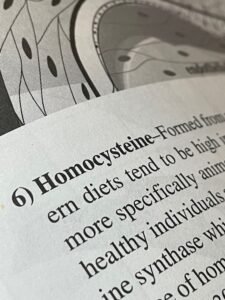Have You Had This Test Yet?…
This simple blood test is called Homocysteine (Hcys).
Homocysteine is an amino acid that is formed from methionine in the body. It is known to be toxic to the arterial wall and the best single indicator of many diseases such as Alzheimer’s disease, cardiovascular diseases, autoimmune disorders, and over 100 diseases in a variety of scientific literature. Homocysteine is formed in the liver during the methylation process. Methylation is an essential and large part of the body’s physiological process that is responsible for regulating gene translation and expression, regulating protein function, and neurotransmitter regulation just to name a few. Often, the level of Hcys is elevated when methylation dysfunction exists.
The optimal (functional) ranges for Hcys for males and females are considered 5-8 umol/L and 4-7 umol/L, respectively. But the upper limit of the normal “Lab” or “Doctor” range that your doctor may go by is around 11umol/L. By the time one reaches this limit, one would be at a significantly higher risk for cardiovascular and other diseases than the general population.
Conditions that are associated with high Hcys levels
- Cardiovascular disease
- Alzheimer’s
- Cerebrovascular disease
- Parkinson’s
- Autoimmune condtions (RA, SLE, etc.)
- Diabetes (type I and II)
- B12 deficiency
- Pernicious anemia
- Hypothyroidism
- Folate deficiency
- Methylation defect
- osteoporosis
- Liver disease
- High protein diet
- High stress
Conditions that are associated with low Hcys levels
- Malnutrition
- Hyperthyroidism
- Medications
- Liver/Kidney disease
- Glutathione deficiency
What Causes the Abnormal Levels of Homocysteine?
The causes and risk factors include;
- Poor diet and lifestyle
- smoking
- certain drugs/medication
- Excessive intake of coffee, alcohol
- kidney disease
- hypothyroidism
- genetics
Studies
Here are some studies on Hcys and disease correlation;
The potential role for elevated homocysteine as a risk factor for severe vascular calcification progression
Journal of American Heart association study
Plasma homocysteine as a risk factor for dementia and Alzheimer’s disease
New England Journal of Medicine
Associations between serum homocysteine levels and anxiety and depression
Symptoms
Although some may show symptoms with abnormal level below, one may not have any symptoms;
- Fatigue
- Weakness
- Paresthesia (tingling sensation)
- Mood changes
- dizziness
- Mouth sores
- Pale or yellowish skin
- anxiety, mental confusion
- weight loss
Diagnoses
The revelation of Hcys level is quite simple. There is a serum blood test for it. This is not a part of regular blood tests such as CBC (Complete Blood Count/Chemistry) or CMP (Comprehensive Metabolic Panel). It is a stand-alone test that can be easily ordered. I often, order this test along with a lipid panel (include total cholesterol, triglycerides, HDL, LDL) since those who have high lipid levels also tend to have high homocysteine levels.
Treatment
The treatment varies depending on the causes and risk factors. Addressing the possible causes and risk factors mentioned above would be the first step. The conventional treatment often includes statin drugs as those who have high Hcys levels may have other cholesterol/lipids/metabolic issues. The natural remedy may include addressing the dietary/lifestyle habit to reduce the risk. A high level of Hcys appears to be correlated to B2, B6, B9 (folate), B12 deficiencies. The level of these nutrients can be easily revealed with simple blood tests as well. As B vitamins are water-soluble nutrients that don’t accumulate in the body, one can safely supplement them to address homocysteinemia. I often recommend a product called “Methyl-Guard Plus” that contains therapeutic dosages of B2, B6, folate, B12, and TMG (Trimethylglycine). Click the link below for further detail.
Here are some interesting studies that show strong correlations between nutrients and cardiovascular, neurological, and psychiatric conditions.
- Dietary Folate and Vitamin B6 and B12 Intake in Relation to Mortality From Cardiovascular Diseases
- Hyperhomocysteinemia and B-vitamin Deficiency in Neurological and Psychiatric Disorders
I find this particular discussion very important as this test appears to be under-utilized to reveal the correlation I discussed in this blog. Should you have any questions, please, don’t hesitate to contact us!
Hope you enjoyed this and found this helpful!
Disclaimer: These statements have not been evaluated by the Food and Drug Administration. The products mentioned on this page are not intended to diagnose, treat, cure, or prevent any disease. The content in this blog should not be used as a substitute for the professional advice and/or recommendation of qualified healthcare practitioners or licensed physicians. The content presented in this blog is intended for information purposes only. Consult your doctor or healthcare practitioners for your current conditions.

ChiroPlus Wellness Care, LLC
303-750-3000
10700 E. Bethany Dr #207, Aurora, CO 80014